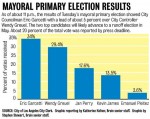The original version of the headline contained multiple errors and has been changed. See the bottom of the article for additional information.
As of press deadline Tuesday night, L.A. mayoral candidate Eric Garcetti held a 5 percent lead over Wendy Greuel in the city primary election results for the next mayor.
None of the eight mayoral candidates had succeeded in capturing a majority of the vote, which is required to win the seat.
It remained likely Garcetti and Greuel would advance to a runoff election on May 21, as of press deadline.
Garcetti, a city councilman in Los Angeles’ 13th district that includes Hollywood, Echo Park and Koreatown, had received 34.05 percent of the L.A. vote while city controller and UCLA alumna Wendy Greuel had captured 29.36 percent.
City councilwoman Jan Perry, who represents Los Angeles’ 9th district which includes Little Tokyo and South Los Angeles, followed with 17.56 percent. Republican Kevin James, a radio talk show host, was fourth place with 14.53 percent of the vote.
The next mayor will take office on July 1, to replace two-term mayor, Antonio Villaraigosa.
Experts had predicted Tuesday’s race to result in a runoff election because no candidate had a distinct lead in the polls before Election Day.
A USC Price/Los Angeles Times poll conducted about two weeks prior to the primary election found Garcetti had almost 27 percent of L.A. voters’ support, while Greuel had about 25 percent. According to the poll, no candidate showed strong support from any one large voter bloc.
Michael Dukakis, former governor of Massachusetts and a visiting professor of public policy at UCLA, also said it would be difficult for a candidate to win 50 percent of the vote while running against so many other candidates.
Voter turnout for the city was significantly low, at about 7.5 percent as of press deadline, with 20 percent of the total poll votes counted. Short lines and empty booths were the norm across Los Angeles, according to the Los Angeles Times.
At UCLA, student and faculty interest in the city election was also limited.
Only a small fraction of registered voters at UCLA came out to vote. At the Rieber Fireside Lounge polling place, about 70 out of 1,680 registered voters submitted their ballots, while only about 20 out of 2,400 registered voters came to De Neve, according to poll workers.
Diana Benitez was a voting inspector for the 2012 presidential election, when the line of voters went out the door and turned around the corner. In Tuesday’s local election, Benitez, who was a voting inspector for Rieber, said it took four hours for the first voter to arrive.
“It’s been super slow – it’s ridiculous,” Benitez said. “People are just not informed since (the election) is not presidential. I just don’t think they care about city elections.”
Students likely lacked interest in the city election because the mayoral candidates did not discuss issues that directly affect students, said Goetz Wolff, a UCLA professor of urban planning at the UCLA Luskin School of Public Affairs.
“I find that puzzling to tell you the truth,” Dukakis said. “If I were running for (mayor), I’d be all over these (L.A. college) campuses trying to recruit students and faculty.”
The five major mayoral candidates came to debate at Royce Hall in late January, and Garcetti paid a visit to Westwood’s Diddy Riese and 800 Degrees Monday night in a last-minute effort to garner student votes .
Some students, like fourth-year psychology student Chelsea Moore, said they were not from Los Angeles and thus did not have a direct interest in the election. Moore said the election is still important, but not as much for her, since she does not plan to stay in Los Angeles after graduation.
Gary Orfield, a political science and education professor, said in general he has not seen much excitement about the mayoral race, and none of the mayoral candidates stood out to him in their visions for the city. He added that he thinks it is unfortunate so many UCLA students do not know much about Los Angeles or about the mayoral race.
“That’s a shame, because this is a university that’s training leaders for the future,” he said.
Orfield said the biggest issue the next mayor will have to face is the city’s budget gap. For the 2012-2013 fiscal year, Los Angeles faced a $238 million budget deficit, a deficit partly closed by cuts to services and employment. The next mayor may also face choices concerning job creation, public transportation and maintaining the city’s infrastructure.
If Garcetti and Greuel are to compete in a May runoff election as expected by press deadline, the two Democratic candidates would need to especially focus on winning the votes of conservatives, because all the conservative mayoral candidates lost on Tuesday, Orfield said.
A runoff election in May would also be more straightforward than the primary, with only two candidates, Orfield added.
“I think people in the city (would) know significantly much more about these candidates (in May),” Orfield said.
Correction: Eric Garcetti and Wendy Greuel’s last names were misspelled.

Kudos to the early morning reporting, but let’s touch up that headline, shall we?
Thank you for pointing that out. We’ve added a correction to the article.